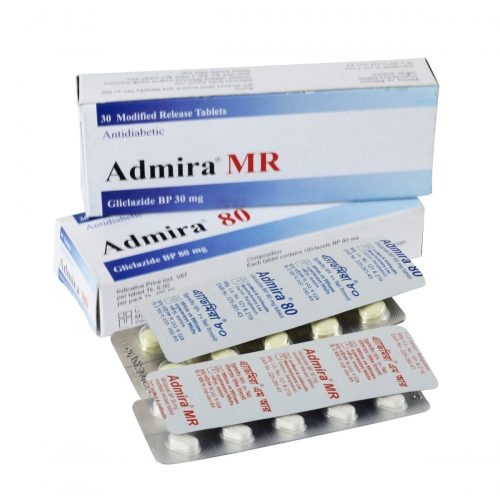ঔষধের বিস্তারিত বা বিকল্প ঔষধ জানতে ঔষধের নাম দিয়ে সার্চ দিন। যেমন- Napa বা Alatrol বা Amodis
Admira 80mg
TabletGliclazide
Unimed Unihealth MFG. Ltd
Other Strength:
- Admira MR 30mg
Alternative:
- Diapro 80mg
- GLICLID 80mg
- Consucon 80mg
- Gluzit 80mg
- Lozide 80mg
- Glucoact 80mg
- Diaprid 80mg
- Glucozid 80mg
- Claz 80mg
- Diglic 80mg
- Sugred 80mg
- Glicron 80mg

Admira
Presentation
Admira 80 Tablet: Yellow, barrel shaped tablet; each tablet contains Gliclazide BP 80 mg.
Admira MR Tablet: White, capsule shaped tablet; each modified release tablet contains Gliclazide
BP 30 mg.
Indications
Admira 80 : Non insulin-dependent (type 2) diabetes mellitus.
Admira MR: Admira MR is indicated for non insulin-dependent diabetes (type 2) in adults when dietary measures, physical exercise and weight loss alone are not sufficient to control blood glucose.
Dosage and administration
For adult use only.
Admira 80 tablet: The total daily dose may vary from 40 to 320 mg (1/2 to 4 Admira-80 tablets) taken orally. The dose should be adjusted according to the individual patient’s response, commencing with 40-80 mg daily (1/2 – 1 Admira-80 tablet) and increasing until adequate control is achieved. A single dose should not exceed 160 mg (2 Admira-80 tablets). When higher doses are required, Admira-80 tablet should be taken twice dialy and according to the main meals of the day. Admira MR: The daily dose may vary from 1 to 4 Admira MR tablets per day i.e. 30 mg to 120 mg taken orally, once daily. It is recommended that Admira MR tablet(s) be taken at breakfast time. If a dose is forgotten, there must be no increase in the dose taken the next day. The recommended starting dose is 30 mg (One Admira MR tablet) daily. If blood glucose is not adequately controlled, the dose may be increased to 60, 90, 120 mg daily in successive steps. The interval between each dose increment should be at least 1 month except in patients whose blood glucose has not reduced after two weeks of treatment. In such cases, the dose may be increased at the end of the second week of treatment. The maximum daily recommended dose is 120 mg (Four Admira MR tablets).
Contra-indications, warnings, etc
Contra-indications: Gliclazide is contra-indicated in case of known hypersensitivity to Gliclazide, other sulphonylureas, sulphonamides. Gliclazide is also contraindicated to type I diabetes, diabetic pre-coma and coma, diabetic keto acidosis, severe renal or hepatic insufficiency, treatment with miconazole. Drug interactions: Miconazole increases the hypoglycaemic effectwith possible onset of hypoglycaemic symptoms, or even coma. Phenylbutazone increases the hypoglycaemic effect of sulphonylureas. Alcohol increases the hypoglycaemic reaction that can lead to the onset of hypoglycaemic coma. So avoid alcohol or medicines containing alcohol during Gliclazide treatment. Precaution: This treatment should be prescribed only if the patient is likely to have a regular food intake (including breakfast). It is important to have a regular carbohydrate intake due to the increased risk of hypoglycaemia if a meal is taken late, if an
inadequate amount of food is consumed or if the food is low in carbohydrate. Hypoglycaemia is more likely to occur during low-calorie diets, following prolonged or strenuous exercise, alcohol intake or if a combination of hypoglycaemic agents is being used. Hypoglycaemia may occur following administration of sulphonylurea. The pharmacokinetics and/or pharmacodynamics of gliclazide may be altered in patients with hepatic insufficiency or severe renal failure.
Use in pregnancy and lactation: There is no experience with the use of gliclazide during pregnancy in humans, even though there are few data with other sulphonylureas. In animal studies, gliclazide is not teratogenic. Oral hypoglycaemic agents are not suitable, insulin is the drug of first choice for treatment of diabetes during pregnancy. It is not known whether gliclazide or its metabolites are excreted in breast milk. Given the risk of neonatal hypoglycaemia, the product is contraindicated in breastfeeding mothers. Side effects: As like other sulphonylureas, treatment with Gliclazide modified release formulation can cause hypoglycaemia, if mealtimes are irregular and, in particular, if meals are skipped. Possible symptoms of hypoglycaemia are: headache, intense hunger, nausea, vomiting, lassitude, drowsiness, sleep disorders, agitation, poor concentration, depression, confusion, visual and speech disorders, aphasia, tremor, paresis, sensory disorders, dizziness, feeling of powerlessness, loss of self-control, delirium, convulsions, shallow respiration, bradycardia, drowsiness and loss of consciousness, possibly resulting in coma and lethal outcome. Gastrointestinal disturbances. If these should occur they can be avoided or minimized if Gliclazide is taken with breakfast.
Pharmaceutical precautions
Store in a cool and dry place, protected from light.
Package quantities:
Admira 80 tablet: Carton containing 30 tablets in blister.
Admira MR tablet: Carton containing 30 tablets in blister.
এই পাতাটি ১৯৭ বার দেখা হয়েছে
রাজডক কী?
ফ্রী সদস্য হোন Click Here
ডাক্তার হিসাবে যোগদান করতে Click Here
নার্স / টেকনোলজিস্ট হিসাবে যোগদান করতে Click Here
ফ্রী সদস্য হোন Click Here
ডাক্তার হিসাবে যোগদান করতে Click Here
নার্স / টেকনোলজিস্ট হিসাবে যোগদান করতে Click Here

